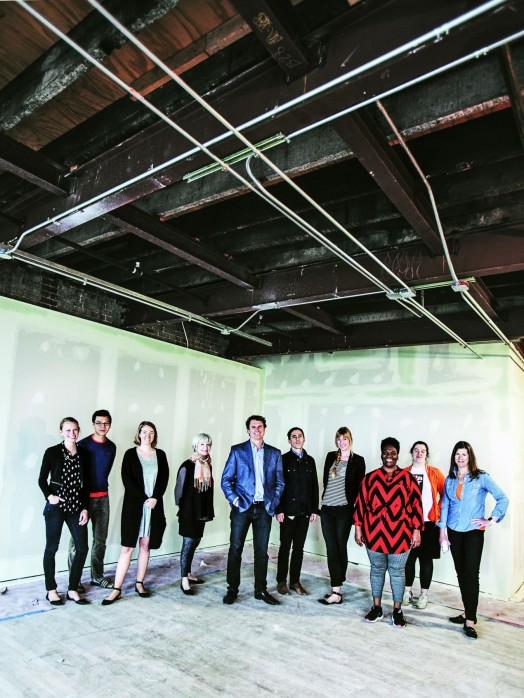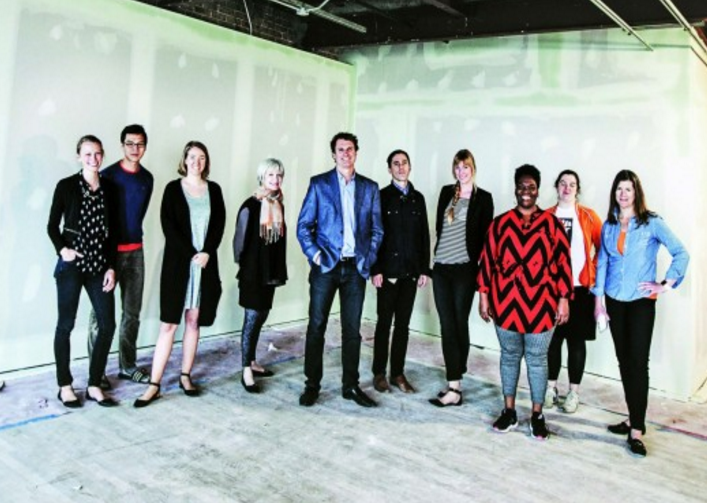Kinda like Utah. Aldy Milliken bouncing through the Great Basin, ATV kicking up dust. Middle of nowhere, no maps, just dirt roads and a mission for the sun. Specifically, Nancy Holt’s Sun Tunnels, a land-art installation on acres and acres of barrenness. There, Milliken can view the blank vastness through the concrete tunnels — four of them huge enough to stand in. He can watch the sun rise and set, the stars.
From the get-go, Milliken, 50, now in his third year as executive director and chief curator of the Kentucky Museum of Art and Craft, knew KMAC lacked this generosity, this openness. He didn’t expect a desert, but the narrow focus within the museum — the staircase in the middle, the glass partition right off the entry like a great divide — needed change. More like a gallery pushing to sell all this craft, less like a museum. There was little transparency, little focus on process, little emphasis on people or sit-and-think space.
Thus, the renovation of the 150-year-old building downtown on West Main Street. A KMAC campaign drive raised $3.3 million for the overhaul, which started last September. A necessary “facelift” after 35 years as an institution. A lift into pellucidity, a new direction. KMAC partnering with Christoff: Finio Architecture of New York — a firm that’s created designs for the New Museum and the Philadelphia Museum of Art — to step forward.
The rejuvenation: “We’re trying to change how you think about art,” Milliken says. “I think people are wary they don’t belong in museums. We are going to break down those barriers.”

Soon, the revelation, the museum set to reopen June 4. Free for all for its first year, thanks to a pretty-penny sponsorship. “We want our audience to participate in the creative learning process. Everyone’s included,” Milliken says. “How can we do that without letting them in?”
The contractor says everything’s crooked. It’s a lot of work to keep a building in its bones. Why keep a skeleton? Why keep the cast-iron facade, the brick that’s seen the 1800s, blackened where once the roof was exposed? Why not strip everything from the insides and start over, the quick and easy route?
“We are referencing our historical shapes and re-imagining them,” says KMAC’s communications manager, Emily Miles, as she leads me through the unfinished space in late March. Blueprints sit about, the radio plays an Arcade Fire song and the hardhats are installing light in the darkness, as if part bat. Bolts and nuts bigger than thumb rings are scattered in boxes. A saw hums.
What heart to throw into this skeleton? Which muscles to mold?
Where there was once a front desk selling tickets is a grand staircase next to the front windows, large and leading up and up. “The stairs show the size of the place. Something we’ve always struggled with. Passersby never knew how big the space is,” Miles says. “Now, it’ll show you there are people here and you can be one of those people.”
The first floor is lots of open space, a continuous flow. “There aren’t as many doors and pathways to go through,” Miles says. The stage in the back is called Studio 715, which will host artist lectures, family art activities and poetry slams.The third floor (we’ll get to the second in a second) will be a place for education. Already KMAC runs field trips four days a week and works with some 33,000 kids, who are face-to-face with the creative process, looking into KMAC’s glass-encased studio for an artist-in-residence. “With the redesign,” Miles says, “we’ll bring even more students in more often.”
To open the heart is to open the mind. To take the literal and surround it with meaning. KMAC is moving away from traditional craft — a pot as a pot, a basket a basket — and finding artists who imbue those basic forms into narrative, make old contemporary. “Our museum was started in 1981, when folk art was at the center,” associate curator Joey Yates says. “I remember when I was younger, there were constantly exposés on Appalachian culture. Bluegrass music was big. These ideas generated KMAC.”
The folk art still remains, as do the ancient bricks. KMAC’s permanent collection houses artists like wood carver Marvin Finn, whose two-headed birds, bright and dotty, flock in painted-steel form at Waterfront Park, and Eastern Kentuckian Minnie Adkins, who whittles wooden animals with sharp lines and funky shapes — the mean red possums, long-necked horse.
For the rotating exhibitions on the second floor, there’ll be a broadening of the mission. The art curated by theme. The first show: “Material Issue.” “Which, come to find out, ‘material issue’ is a legal term meaning in a trial anything that is arguable in relation to the case must be dealt with. Like a political issue that you can’t touch but is certainly important for us to problem-solve or define,” Yates says. “Plus, it’s a look at the actual material the artist is using to make their art, and how does that inform the work.”
There’s ceramist Jessica Jackson Hutchins and her huge pots weighing down couches, a reference to the female experience and how women, who hold the key in a lot of traditional art techniques, are more than just the bowls from which we eat. There’s Susan Collis questioning how we value materials, engraving mother-of-pearl and turquoise and real gold on everyday items like an old stepladder, a nail in the wall, a crumpled up piece of paper. There’s David Adamo whittling down and whittling down a Slugger bat into a frail shadow of masculinity. There’s multimedia artist Cory Arcangel (Arcangel!) using pool noodles (pool noodles!) and dressing them in tall socks, Nike sweatbands and Beats headphones to nod at what teens see in each other: material.
There’s finding the wider world, that desert with oasis after oasis.



